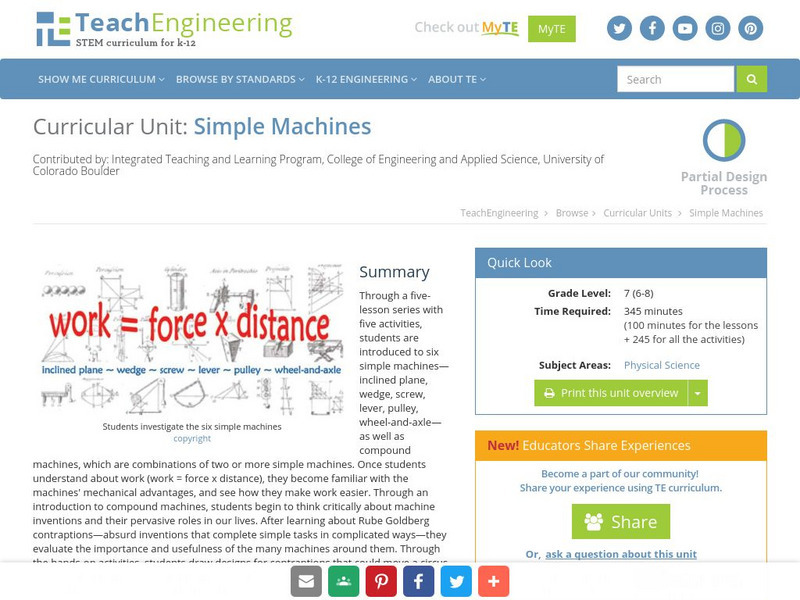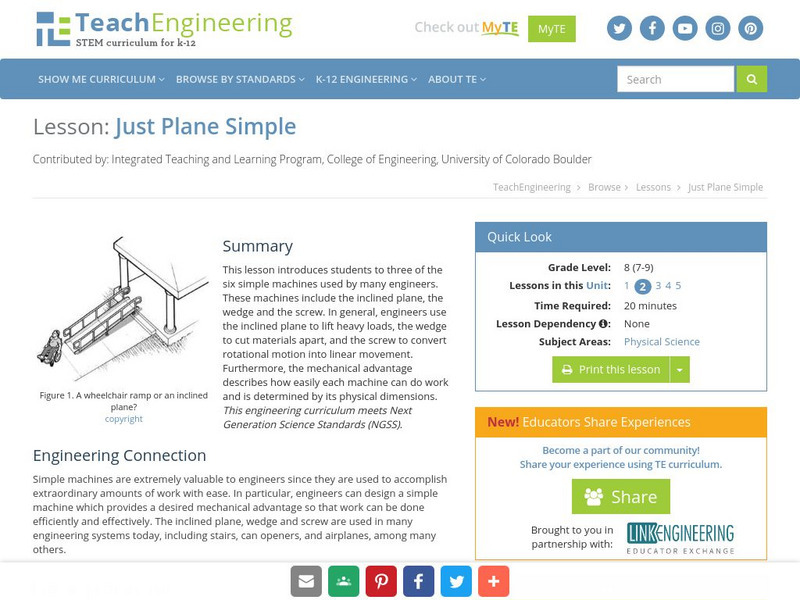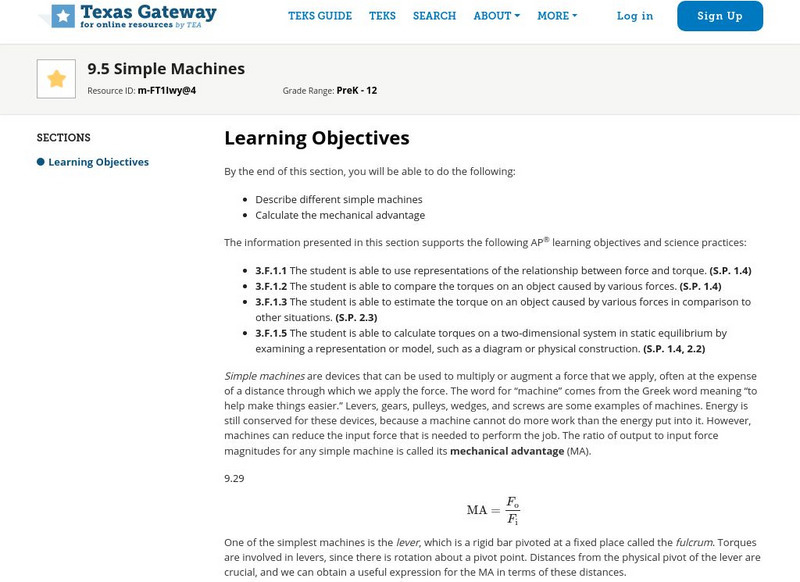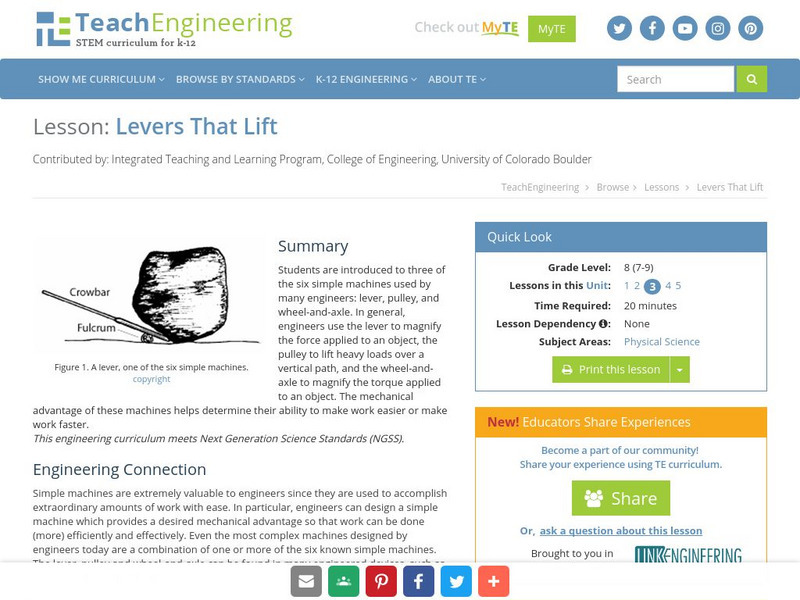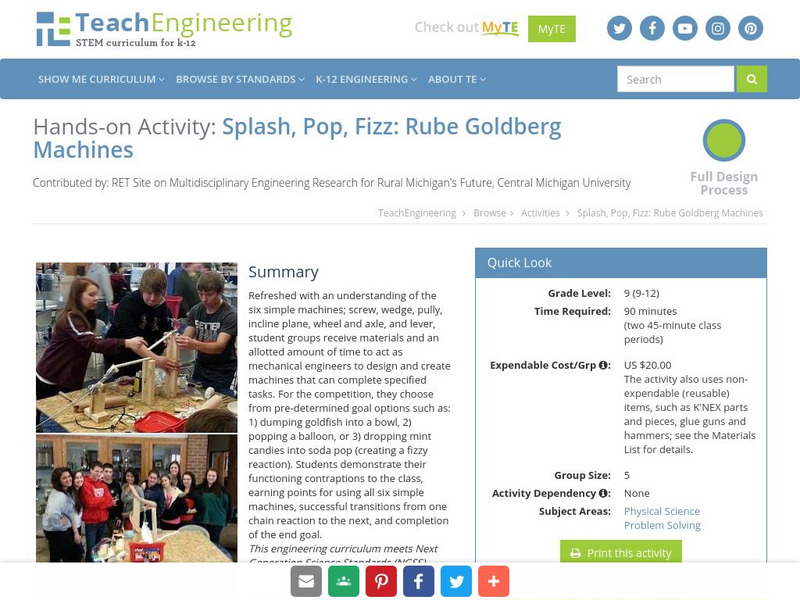Integrated Publishing
Integrated Publishing: Mechanical Advantage
Good descriptions and diagrams to help explain the mechanical advantage of machines. Includes sample calculations of this quantity.
TeachEngineering
Teach Engineering: Simple Machines
Through a five-lesson series with five hands-on activities, students are introduced to six simple machines - inclined plane, wedge, screw, lever, pulley, wheel-and-axle - as well as compound machines, which are combinations of two or...
TeachEngineering
Teach Engineering: Tools and Equipment, Part I
Through a series of activities, students discover that the concept of mechanical advantage describes reality fairly well. They act as engineers creating a design for a ramp at a construction site by measuring four different inclined...
TeachEngineering
Teach Engineering: Machines and Tools, Part Ii
In this activity, students gain first-hand experience with the mechanical advantage of pulleys. Students are given the challenge of helping save a whale by moving it from an aquarium back to its natural habitat into the ocean. They set...
OpenStax
Open Stax: Simple Machines
From a chapter on Statics and Torque in a Physics textbook. This section of the chapter discusses the different types of simple machines and how to calculate their mechanical advantage. Includes questions, problems and exercises.
TeachEngineering
Teach Engineering: Just Plane Simple
This instructional activity introduces students to three of the six simple machines used by many engineers. These machines include the inclined plane, the wedge and the screw. In general, engineers use the inclined plane to lift heavy...
TeachEngineering
Teach Engineering: Simple Machines From Pyramids to Skyscrapers
Simple machines are devices with few or no moving parts that make work easier, and which people have used to provide mechanical advantage for thousands of years. Students learn about the wedge, wheel and axle, lever, inclined plane,...
TeachEngineering
Teach Engineering: Powerful Pulleys
Students continue to explore the story of building a pyramid, learning about the simple machine called a pulley. They learn how a pulley can be used to change the direction of applied forces and move/lift extremely heavy objects, and the...
CK-12 Foundation
Ck 12: Physical Science: Screw
[Free Registration/Login may be required to access all resource tools.] What a screw is, how it works and its mechanical advantage.
CK-12 Foundation
Ck 12: Physical Science: Wedge
[Free Registration/Login may be required to access all resource tools.] What a wedge is and its mechanical advantage, how it changes force to make work easier.
Integrated Publishing
Integrated Publishing: The Inclined Plane and the Wedge
Outlines the wedge and inclined plane, including their uses in everyday life and their mechanical advantages.
Science Education Resource Center at Carleton College
Serc: Levers: How the Human Body Uses Them to Its Advantage
Students will apply the concept of levers to the human body and build all three classes of levers within a musculoskeletal context. They will be shown how the musculoskeletal system is a system of levers and one example of each type of...
Texas Education Agency
Texas Gateway: Statics and Torque: Simple Machines
By the end of this section, you will be able to describe different simple machines and to calculate the mechanical advantage.
TeachEngineering
Teach Engineering: Wide World of Gears
In an interactive and game-like manner, students learn about the mechanical advantage that is offered by gears. By virtue of the activity's mechatronics presentation, students learn to study a mechanical system as a dynamic system under...
CK-12 Foundation
Ck 12 Exploration Series: Simulations: Physics: See Saw
[Free Registration/Login Required] How does a See Saw allow you to "lift" someone who is heavier than you? This module helps students understand about torque and mechanical advantage.
CK-12 Foundation
Ck 12 Exploration Series: Simulations: Physics: Block and Tackle
[Free Registration/Login Required] A video module where students learn about the relationship between force, work, energy, and mechanical advantage using a simple machine.
Georgia Department of Education
Ga Virtual Learning: Physical Science: Work and Energy
Find out about simple machines, calculate the mechanical advantage and efficiency of machines, differentiate potential and kinetic energy, and learn ways to use energy more efficiently.
PBS
Pbs Learning Media: Lever an Obelisk
Investigate the mechanical advantage of the lever in this interactive activity from the NOVA Web site.
Creative Science Centre
Creative Science Centre: Newton's Experiments
A collection of projects that recreated Isaac Newton's experiments as he would have built them in the seventeenth century. The projects include the mechanical advantage possible using three levers, the trajectory of a projectile, air...
TeachEngineering
Teach Engineering: Pulley'ing Your Own Weight
Using common materials (spools, string, soap), students learn how a pulley can be used to easily change the direction of a force, making the moving of large objects easier. They see the difference between fixed and movable pulleys, and...
TeachEngineering
Teach Engineering: Levers That Lift
This lesson introduces students to three of the six simple machines used by many engineers: the lever, the pulley, and the wheel-and-axle. In general, engineers use the lever to magnify the force applied to an object, the pulley to lift...
Other
Ontario Council for Technology Education: Designing and Testing a Crane [Pdf]
By the end of this project, students will be familiar with the 6 different simple machines and will be able to identify how these machines are used in products and tools they use on a daily basis. They will investigate how mechanical...
TeachEngineering
Teach Engineering: Splash, Pop, Fizz: Rube Goldberg Machines
Refreshed with an understanding of the six simple machines; screw, wedge, pully, incline plane, wheel and axle, and lever, student groups receive materials and an allotted amount of time to act as mechanical engineers to design and...
TeachEngineering
Teach Engineering: The Claw
Students learn about gear ratios and power by operating toy mechanical cranes of differing gear ratios. They attempt to pick up objects with various masses to witness how much power must be applied to the system to oppose the force of...
Other popular searches
- Ideal Mechanical Advantage
- Levers Mechanical Advantage
- Ramp Mechanical Advantage
- Mechanical Advantage Pulley

